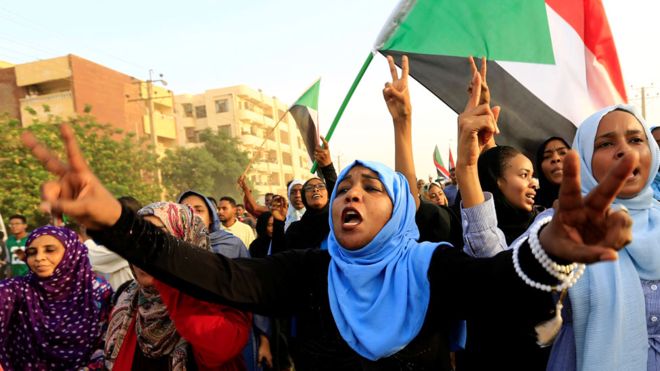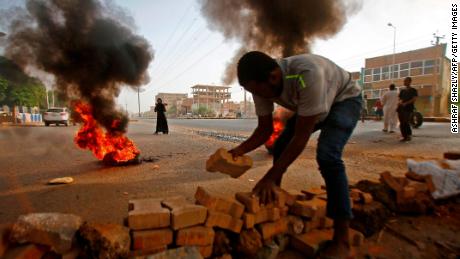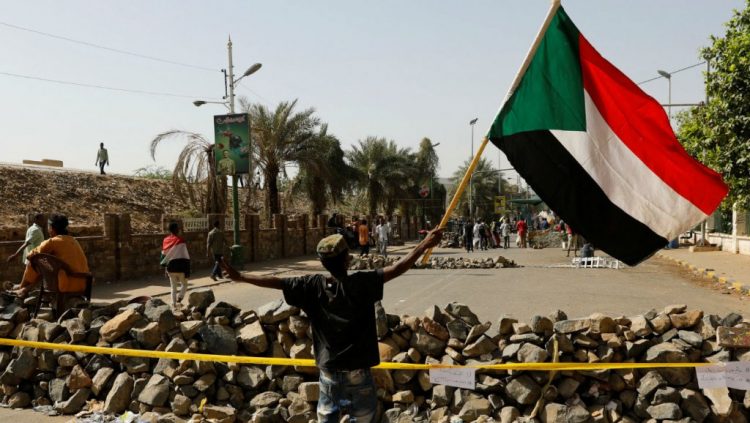www.aljazeerah.info
News, July 2019
Archives
Mission & Name
Conflict Terminology
Editorials
Gaza Holocaust
Gulf War
Isdood
Islam
News
News Photos
Opinion Editorials
US Foreign Policy (Dr. El-Najjar's Articles)
www.aljazeerah.info
|
Editorial Note: The following news reports are summaries from original sources. They may also include corrections of Arabic names and political terminology. Comments are in parentheses. |
Sudanese Protests Call for Justice for Revolution Martyrs, the Ruling Junta Continues its Grip on Power
July 14, 2019
 |
 |
|
Sudanese protesters hold picture of a student killing during the
protests on 13 July 2019 |
Sudanese protesters marking 40 days since the killing of pro-democracy campaigners, July 14, 2019 |
 |
 |
| A Sudanese protester uses paving stones to block Street 60 as military forces tried to disperse a sit-in on June 3, 2019 |
Sudanese hold protests calling for justice for revolution martyrs
Sudan Tribune, July 13, 2019 (KHARTOUM) -
Thousands of demonstrators took to the streets of the Sudanese capital and other cities on Saturday chanting slogans calling for justice for the victims killed during the peaceful protests against since December 2018.
The protests took place in different towns of Khartoum state, and other towns of central, eastern and southern Sudan including Madani, Gaderf, Kassala, Port Sudan, El-Obeid, Atbara, Singa.
The protesters carried banners calling for justice such as "Justice First" and pictures of the victims who fell during the waves of protests across the country that began on 13 December last year.
Also, thousands gathered at the houses of the "martyrs of the revolution" where slogans for justice were mixed with tears of their relatives and friends.
Sudan Tribune reporters noticed that the crowds in some areas launched their protests and gatherings hours before (05.00 PM) the official hour determined by the Forces for Freedom and Change.
The security authorities did not disperse peaceful demonstrations but closed three bridges to prevent protesters from crossing into Khartoum city.
The Police deployed barbed wire on the Manshiyya, Mek Nimir and Blue Nile bridges, to prevent protesters from crossing into Khartoum from Khartoum North and Omdurman cities.
The 13 July protests come 40th days after the killing of over a hundred protesters by the security forces on 3 June.
Sudanese used in their traditions to organize a traditional memorial service for the dead gathering family and friends on the 40th day after the death.
The FFC called on Friday evening, the Sudanese public, to participate in the processions of "Justice First."
The opposition alliance also identified 20 points of gathering for the demonstrations in the three cities of the capital (Khartoum, Khartoum North and Omdurman) which end at the homes of a number of victims of the sit-in.
The opposition coalition in its statement recalled that those responsible for the crimes and violations committed in the sit-in’s massacre must be held accountable
"These crimes cannot be negotiated by any political or trade union forces," the FFC said and called for an independent and transparent investigation into these crimes.
The opposition accuses the military junta of ordering the raid on the pro-democracy sit-in outside the Sudanese army headquarters in Khartoum. Over 128 people were killed according to the opposition as the health ministry officials say the death toll reached 61 people.
Sudan’s ruling junta appeals court ruling to restore internet
Sudan Tribune, July 14, 2019 (KHARTOUM) -
Sudan’s presidency legal adviser has asked a high court in Khartoum on Sunday to reverse the decision to restore the Internet service for the mobile phone in the country.
Yasir Mirghani, the secretary-general of the Sudanese Consumers Protection Society (SCPS) told Sudan Tribune that the legal adviser to the presidency, Haydar Ahmed Abdallah, filed an appeal with the Khartoum District Court requesting the cancellation of the decision to return the Internet services.
He said that the SCPS legal adviser objected to the appeal pointing to the absence of a presidential institution in the country, after the fall of ousted President Omer al-Bashir.
"We asked the legal adviser to bring a written accreditation to clarify who represents," Yasir further said.
Sudan’s ruling Transitional Military Council (TMC) ordered to shut down internet access to customers citing security concerns last month after a deadly raid on a pro-democracy sit-in in the capital Khartoum on 3 June
The TMC established its offices at the Sudanese presidency in Khartoum and used to hold meetings and receive visitors there.
On 9 July, a Khartoum court ordered telecommunication companies to restore the internet services in the country.
Yasir expected that the court will hold a hearing when the legal adviser of the Sudanese presidency submits his credentials issued by an authority he represents.
(ST)
Sudan: Protesters demand justice for killed persons
By Libyan Express,
13 July 2019Sudanese protester uses paving stones to block Street 60 as military forces tried to disperse a sit-in on June 3, 2019. [Photo: Getty Images] Thousands of Sudanese flooded the streets of the capital of Khartoum and other cities Saturday to mark the 40th day since the deadly dispersal of a protest sit-in as the country’s ruling generals and pro-democracy movement prepared to sign a power-sharing deal.
The “Justice First” marches were called by the Sudanese Professionals’ Association, which has been spearheading the protests since December. Those demonstrations led to the military ouster of autocratic president Omar al-Bashir in April.
The marches mark 40 days since the dispersal of the pro-democracy protesters’ sit-in in outside military headquarters in Khartoum on June 3. Protest organizers say security forces killed at least 128 people during the dispersal and subsequent crackdown. Authorities, however, put the death toll at 61, including three from security forces.
Protesters have called for a “transparent and fair” investigation into the deaths.
Footage and photos posted by the SPA showed thousands of people demonstrating in the capital and its sister city of Omdurman. There were protests in other places, including the Red Sea city of Port Sudan and the eastern province of Kassala.
Protesters were seen waving Sudanese flags and posters that read: “Freedom, Peace and Justice” and “Civilian (authority) is the people’s choice.”
The protest organizers hope that large numbers take part in the marches similar to massive demonstrations on June 30, when tens of thousands of demonstrators flooded the streets in the biggest show of numbers in the uprising. At least 11 people were killed in clashes with security forces, according to protest organizers.
Saturday’s marches also put pressure on the ruling military council as it and the Forces for Declaration of Freedom and Change, which represents the protesters, planned to meet to sign a power-sharing agreement. African Union envoy Mohammed el-Hassan Labat originally said a meeting would take place Saturday night. But Ahmed Rabei, a spokesman for the SPA, said later the protest movement called for the talks to be postponed until Sunday “for more consultations” within the FDFC on the deal
The signing ceremony was expected to take place earlier this week, but several delays have been announced, raising suspicions the two parties might still be divided over the agreement’s details.
The Sudanese Communist Party, which is part of the protest movement, criticized the “vague” talks between the military council and the FDFC. Mahmoud al-Khateib, the party’s political secretary, said his party rejected the current members of the military council participation in the transition.
The deal includes a joint Sovereign Council set to rule for a little over three years while elections are organized, along with a constitutional declaration, according to a copy of the deal obtained by The Associated Press. A military leader is to head the 11-member council for the first 21 months, followed by a civilian leader for the next 18.
The deal, which also includes an FDFC-appointed cabinet, was meant to end a weekslong political deadlock between the military and protesters since the Khartoum sit-in site was cleared.
They also agreed on an independent Sudanese investigation into the deadly crackdown by security forces on the protests last month, though it’s unclear if anyone will be held accountable, AP reported.
Sudan crisis: Protester 'shot dead' in Sinnar as talks stall
14 July 2019, BBC
Image copyright Reuters Image caption A march was held on Saturday to mark 40 days since the killings of pro-democracy campaigners.
A Sudanese protester has been shot dead by members of a feared paramilitary group, pro-opposition doctors say.
The man was shot in the head by members of the Rapid Support Forces (RSF) in the south-eastern Sinnar state, during a protest against allegations of RSF brutality, they say.
Neither the RSF nor Sudan's ruling military council has commented.
The shooting comes as the signing of a power-sharing deal agreed earlier this month has once more been delayed.
The military seized power in April following months of street demonstrations against long-time leader Omar al-Bashir but the protest leaders feared that real power remained in the same hands and continued their sit-ins.
The march in the Sinnar town of al-Suki was called to demand that RSF fighters leave the town, which lies 340 km (201 miles) south-east of the capital, Khartoum.
"RSF members deployed and initially started shooting in the air but later they opened fire at residents, killing a man and wounding several other people," a witness, who declined to be named for security reasons, told the AFP news agency.
On Saturday, thousands of people marched through Khartoum calling for justice for those killed on 3 June, when the RSF attacked a protest camp, reportedly killing at least 128 people - a figure disputed by the military authorities.
Some of the marchers lit candles, while others used the torches on their mobile phones to commemorate the "martyrs", on the 40th day since their deaths, an important milestone in many cultures.
Image copyright Reuters
What happened on 3 June?
Two men who said they were serving RSF officers have told the BBC that the attack was ordered by the RSF leadership. Their allegations could not be independently verified by the BBC.
Media captionWhat happened during the 3 June massacre?
The RSF leadership has denied responsibility, and claimed that rogue elements were behind the attack.
The RSF grew out of the Janjaweed militia which was accused of carrying out a genocide in the Darfur region of western Sudan.
What's going on with the talks?
The RSF commander, General Mohamed Hamdan "Hemeti" Dagolo, is the vice-president of the military council, seen by many as the real power in the country.
On Saturday, he gave a speech calling for all Sudanese to support the power-sharing deal and warned that without it, there was a risk of Sudan sliding into civil conflict.
Under the deal, the military would head a transitional authority for 21 months, with a civilian figure in charge for the next 18 months, after which elections would be held.
The agreement, brokered by African Union negotiators, also included a pledge to investigate the recent violence.
However, it has still not been signed 10 days after it was agreed, with negotiators reported to still be haggling over the details.
https://www.bbc.com/news/world-africa-48983139
***
Share the link of this article with your facebook friendsFair Use Notice
This site contains copyrighted material the
use of which has not always been specifically authorized by the copyright
owner. We are making such material available in our efforts to advance
understanding of environmental, political, human rights, economic,
democracy, scientific, and social justice issues, etc. We believe this
constitutes a 'fair use' of any such copyrighted material as provided for
in section 107 of the US Copyright Law. In accordance with Title 17 U.S.C.
Section 107, the material on this site is
distributed without profit to those
who have expressed a prior interest in receiving the included information
for research and educational purposes. For more information go to: http://www.law.cornell.edu/uscode/17/107.shtml.
If you wish to use copyrighted material from this site for purposes of
your own that go beyond 'fair use', you must obtain permission from the
copyright owner.
|
|
|
|
||
|
||||||


